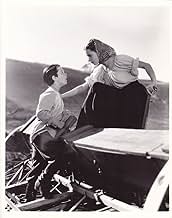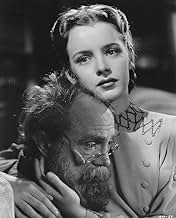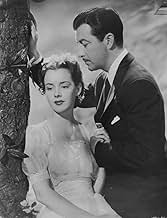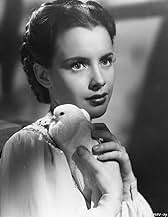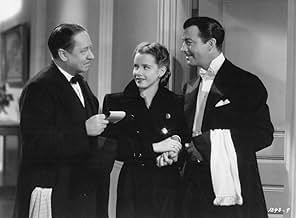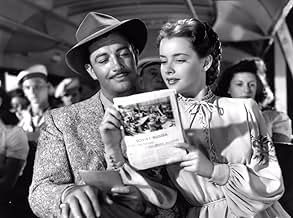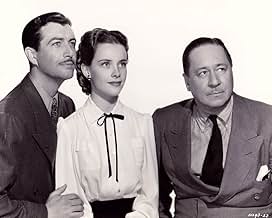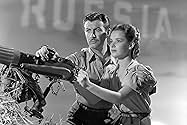CALIFICACIÓN DE IMDb
5.8/10
337
TU CALIFICACIÓN
Agrega una trama en tu idiomaPropaganda film from WW2, designed to raise the awareness of the American public regarding USSR's fight against Nazi Germany.Propaganda film from WW2, designed to raise the awareness of the American public regarding USSR's fight against Nazi Germany.Propaganda film from WW2, designed to raise the awareness of the American public regarding USSR's fight against Nazi Germany.
- Dirección
- Guionistas
- Elenco
- Premios
- 2 premios ganados en total
Konstantin Shayne
- Wounded Soldier
- (as Konstantine Shayne)
John Wengraf
- Red Army Commander
- (as John E. Wengraf)
Opiniones destacadas
I'll be the first to admit that this film was a bald effort at propaganda. I'll also admit that the conditions depicted in Russia were far from reality. However, this isn't the first effort at propaganda by Hollywood, nor is it the first (or the thousandth) that takes a wide berth from reality.
If you look at the movie's setting (happy Russians with a benevolent leader) as fantasy, and imagine the Russia shown in the movie as a mythical nation, then you have a dandy story here. Propaganda aside, the storyline here is excellent; it's engrossing, well-written and intelligent. The acting is superb, from top stars Taylor and Peters down to the bit players and extras. The dance scenes are well choreographed.
The music, mostly that of Tchaikovsky, is superb, and the soundtrack is masterfully woven into the background throughout the story. The music is well-played and well conducted by Albert Coates (who also did the piano work). As for the piano, Susan Peters does a good job of finger placement that could fool all but the trained eye into thinking that she could actually play the piano (she couldn't at the level shown in the movie). The one fault herein is Taylor's attempts to imitate a conductor: suffice it to say that it's out of sync and overstated to the point of absurdity.
As a side note, many of the members of the Peter Meremblum orchestra (prodigal young musicians, many of whom went on to careers in music, and a few of whom became very well-known in the world of music) appear throughout the movie, mainly as extras and as kids in the village and youths in the Moscow Conservatory. The orchestra also performed some of the background music.
All in all, this is an excellent movie if one can overlook the propaganda and anti-realism and treat it as a fantasy/fiction.
If you look at the movie's setting (happy Russians with a benevolent leader) as fantasy, and imagine the Russia shown in the movie as a mythical nation, then you have a dandy story here. Propaganda aside, the storyline here is excellent; it's engrossing, well-written and intelligent. The acting is superb, from top stars Taylor and Peters down to the bit players and extras. The dance scenes are well choreographed.
The music, mostly that of Tchaikovsky, is superb, and the soundtrack is masterfully woven into the background throughout the story. The music is well-played and well conducted by Albert Coates (who also did the piano work). As for the piano, Susan Peters does a good job of finger placement that could fool all but the trained eye into thinking that she could actually play the piano (she couldn't at the level shown in the movie). The one fault herein is Taylor's attempts to imitate a conductor: suffice it to say that it's out of sync and overstated to the point of absurdity.
As a side note, many of the members of the Peter Meremblum orchestra (prodigal young musicians, many of whom went on to careers in music, and a few of whom became very well-known in the world of music) appear throughout the movie, mainly as extras and as kids in the village and youths in the Moscow Conservatory. The orchestra also performed some of the background music.
All in all, this is an excellent movie if one can overlook the propaganda and anti-realism and treat it as a fantasy/fiction.
Look: This film IS propaganda, but it certainly isn't Soviet propaganda. I think it is clear from watching the film disinterestedly and/or reading ALL of the transcripts of Ayn Rand's HUAC testimony that it was American wartime propaganda aiming at 1) strengthening political ties with its then-ally Soviets, and 2) convincing the American's that they should support the joint effort with the Russians against Germany. The US was too afraid to admit to the American people that they, like, Churchill said, had to work with the devil to defeat Hitler; they used propaganda film instead (ad not just here, but overtly as part of Frank Capra's "Why We Fight" series). Further, I think it is probable, as a previous poster mentioned, that they are only guilty of writing a very ill-conceived "love knows no bounds" kind of war time love story; this is just a year or so after Casablanca, after all! The movie certainly was picked up, partly on the basis of the love-knows-no-bounds angle, but more overtly b/c, as the awful Robert Taylor pointed out in his own HUAC testimony, the request came from the US State department.
Who knew that life under a brutal totalitarian regime could be so carefree? Even though the film was made for World War II propaganda purposes, the inanities that litter this film have to be seen to be believed. (That would be difficult, I know, since it is not available on videotape. or DVD.)Among the aspects of Russian life, circa 1941, to which this film introduces us are: town meeting democracy, freedom of religion, rural peasants who eat hearty meals at tables set with china, crystal and silver, and on and on. Soviet barbarities are played down or, more usually, ignored altogether. I saw this film in Washington around 1983 as part of a twin bill with the other infamous WWII paeon to Stalin's Russia, "Mission to Moscow." I think the latter was, in places, at least a bit more honest than this rose-colored clunker. If ever you wondered why Congress went hunting for Communists in Hollywood, check out these two films.
Like a previous writer, I too saw this movie as a child during World War 11.
I really cannot comment on its artistic value so many years later, however, as a young person ( with my Father overseas)during that point in history, it was something to see to bring closer the effects and personality of war. The one poignant thing about the movie that I still remember clearly was the playing of Tchaikovsky's very famous Piano Concerto #1 in B-Flat. It was my first real introduction to classical music. If nothing else, I am thankful for the film bringing this to me, for it and classical music have played an enormous part in my life ever since! It led me to study music and have been professionally involved in music all my working life. My thanks go to "Song Of Russia" and Tchaikovsky -Doug-
I really cannot comment on its artistic value so many years later, however, as a young person ( with my Father overseas)during that point in history, it was something to see to bring closer the effects and personality of war. The one poignant thing about the movie that I still remember clearly was the playing of Tchaikovsky's very famous Piano Concerto #1 in B-Flat. It was my first real introduction to classical music. If nothing else, I am thankful for the film bringing this to me, for it and classical music have played an enormous part in my life ever since! It led me to study music and have been professionally involved in music all my working life. My thanks go to "Song Of Russia" and Tchaikovsky -Doug-
During the period of truce of the Hitler-Stalin pact, American symphony conductor Robert Taylor is touring the Soviet Union with his manager Robert Benchley. Soviet classical pianist Susan Peters stalks Taylor, but eventually gets to meet him when she sits down and plays Tonight We Love. That little piece of Tschaikovsky was a big pop hit in America at the time.
It's a tender love story that develops between Taylor and the classical groupie and they marry. He visits her in her village, meets her people and is really impressed by the way they've just taken to Communism.
Of course Hitler blinks in the game of diplomatic chicken he was playing with Stalin and attacks the Soviet Union. The people organize and resist. What will happen with Taylor and Peters.
Robert Taylor resisted loud and long about doing this film, it seared at his anti-Communist soul. But he was also an agreeable contract employee at MGM and Louis B. Mayer said he wasn't thrilled about it either, but that the request for this film came directly from the Office of War Information. Of course being hammerlocked into doing Song of Russia is what ultimately led to Taylor being a friendly witness at the House Un American Activities Committee.
You could see Taylor's heart wasn't in this one. Susan Peters comes out so much the better. What a tragic loss she was, a bright beautiful girl with a great career ahead of her, paralyzed and eventually dying from a hunting accident.
Like 20th Century Fox's North Star, Song of Russia has so much music in it, it could qualify as a musical. Jerome Kern and E.Y. Harburg contributed a forgettable song called And Russia Is Her Name. Like North Star, Song of Russia was later cited as two of the three biggest examples of Communist influence in Hollywood, the other being Mission to Moscow.
The Soviets at great sacrifice saved the world from Hitler and made it possible for Soviet ideological driven imperialism to move into the vacuum. Now that the Cold War is receding in our collective consciousness, maybe a film showing the Russian contribution to winning World War II can be made without arousing all the right wing yahoos.
This one certainly wasn't it.
It's a tender love story that develops between Taylor and the classical groupie and they marry. He visits her in her village, meets her people and is really impressed by the way they've just taken to Communism.
Of course Hitler blinks in the game of diplomatic chicken he was playing with Stalin and attacks the Soviet Union. The people organize and resist. What will happen with Taylor and Peters.
Robert Taylor resisted loud and long about doing this film, it seared at his anti-Communist soul. But he was also an agreeable contract employee at MGM and Louis B. Mayer said he wasn't thrilled about it either, but that the request for this film came directly from the Office of War Information. Of course being hammerlocked into doing Song of Russia is what ultimately led to Taylor being a friendly witness at the House Un American Activities Committee.
You could see Taylor's heart wasn't in this one. Susan Peters comes out so much the better. What a tragic loss she was, a bright beautiful girl with a great career ahead of her, paralyzed and eventually dying from a hunting accident.
Like 20th Century Fox's North Star, Song of Russia has so much music in it, it could qualify as a musical. Jerome Kern and E.Y. Harburg contributed a forgettable song called And Russia Is Her Name. Like North Star, Song of Russia was later cited as two of the three biggest examples of Communist influence in Hollywood, the other being Mission to Moscow.
The Soviets at great sacrifice saved the world from Hitler and made it possible for Soviet ideological driven imperialism to move into the vacuum. Now that the Cold War is receding in our collective consciousness, maybe a film showing the Russian contribution to winning World War II can be made without arousing all the right wing yahoos.
This one certainly wasn't it.
¿Sabías que…?
- TriviaDebut of actress Joan Lorring.
- ErroresAlthough the film is set during the Axis invasion of the Soviet Union in 1941, uniforms and equipment shown in both the stock footage and the American-filmed scenes are largely from the period of 1943-44, when the film was made. Of particular note are the helmets and rank insignia which are indicative of this later era.
- ConexionesFeatured in Red Hollywood (1996)
- Bandas sonorasPiano Concerto No.1 in B flat minor, Op.23
(uncredited)
Music by Pyotr Ilyich Tchaikovsky
[Played by Susan Peters on piano, with an orchestra at a rehearsal; Reprised at a concert on tour in Russia, with Albert Coates on piano; Reprised by Peters in a New York concert; Excerpts played often in the score, adapted by Herbert Stothart]
Selecciones populares
Inicia sesión para calificar y agrega a la lista de videos para obtener recomendaciones personalizadas
Detalles
Taquilla
- Presupuesto
- USD 1,828,000 (estimado)
- Tiempo de ejecución1 hora 47 minutos
- Color
- Relación de aspecto
- 1.37 : 1
Contribuir a esta página
Sugiere una edición o agrega el contenido que falta

Principales brechas de datos
What is the Spanish language plot outline for Sombras en la nieve (1944)?
Responda

